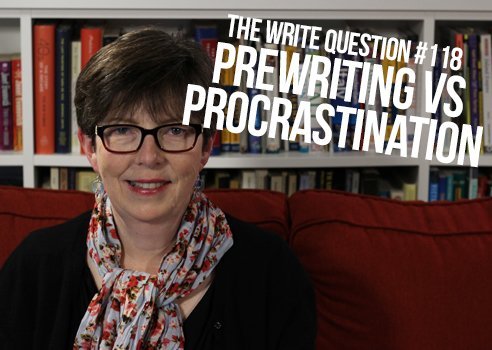Viewing time: 4 mins 37 secs
The Write Question is a weekly video podcast about writing that I started in 2017 and that ran, more or less weekly, until April 2022. This is a republication of issue #118, which discusses the difference between prewriting and procrastination. The post first ran on Nov. 29/19.
Transcript:
Have you ever tried prewriting? And do you wonder if it might be a form of procrastination? That’s the topic I’m addressing today in The Write Question. I’m Daphne Gray-Grant, the Publication Coach.
I have a question from Julia Lopez, a writer based in Mendocino, California. Here’s what she’s asked via email: “What’s the difference between pre-writing and procrastination?”
Thanks for the question, Julia. I emailed you to try to get some clarification, but didn’t hear back. I was curious to know exactly what you meant by “pre-writing.” It’s one of those terms that’s interpreted by people in different ways. So, I can’t give you a straight yes or no answer, I’m afraid. Instead, I have to say, “it depends.”
Some people define prewriting as the following tasks:
- Reading about your subject area
- Choosing a topic
- Taking notes
- Organizing your information
- Doing a mindmap
If that’s your definition of prewriting, then I say, Congratulations! You are not procrastinating. Instead, you’re doing the type of work that will make writing easier and more fluent for you.
Now, keep in mind that it’s possible to delay or procrastinate with any type of work. While I was researching this topic, I discovered an amusing pie graph developed by someone who appears to be a teacher. He shows how he thinks the creative process works, illustrating that only a small wedge goes to creative thinking. The rest, he suggests, goes to binge eating, discouraged napping and random internet surfing. I provide a link below so you can see his blog post.
Remember, according to my formula, you should spend as much as 40% of your total writing time on focused prewriting activities. If you’ve done adequate prewriting, the writing stage should be really fast, taking only 20% of your time. That still leaves a remaining 40% for editing. And you need that time.
Also, remember that outlines could theoretically be considered a prewriting activity, but I believe they are damaging at this stage of the game. Instead, outlines are far more useful as an editing tool AFTER you’ve finished writing. Instead of outlining before writing, I promote mindmapping. I’ve done lots of posts and videos on this topic and I include a link to these posts below.
Besides outlining there’s also another task I don’t think you should do as a prewriting activity and that’s so-called “free writing.”
Why am I opposed to this? Actually, I’m not opposed to free writing if people approach it the way its major proponents — Peter Elbow and Julia Cameron — intended. See link below for a video I’ve done on dealing with a creative dry spell. I address free writing in more detail there.
What really distresses me is when I see people who don’t know what to write about yet or who haven’t figured out their main point, writing so they can figure out what they want to say. This leads to all sorts of unnecessary and time-consuming work and slows the writing process to a crawl.
If you think this problem might apply to you, have a look at an earlier video I’ve done on the topic. It appears under the headline “How you can speed up your free writing.” See link below.
Julia, the bottom line is preparation, sometimes called pre-writing, is a necessary part of the writing process. As long as it’s done in the right way, it’s not procrastination at all.
Finally, let me wrap up with a quote from Benjamin Franklin: Mila: “You may delay, but time will not.”
Julia, the biggest mistake that most writers make is that they don’t start their work early enough. If you start with pre-writing activities, as long as you don’t get sucked into free writing, you are more likely to succeed.
Links
Pie chart on the creative process
Links to Daphne’s posts and videos on mindmapping
Dealing with a creative dry spell (video)


